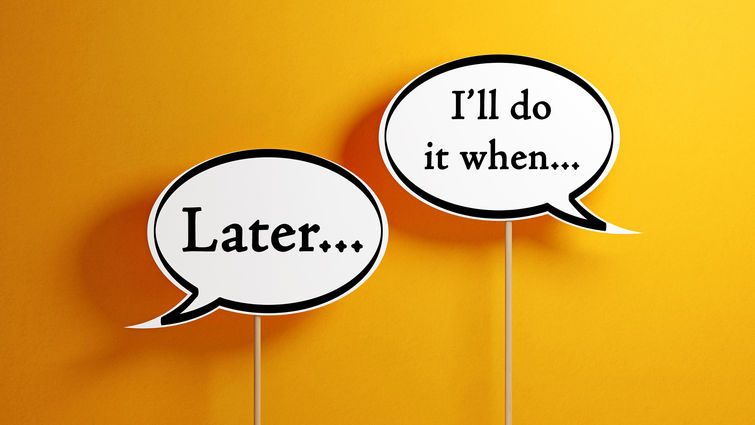
Excuses
Procrastination is an issue most people face at one point or another. It often means putting something off until later, or trying to avoid a task altogether. Regardless of the reason, procrastinating is a bad habit that can actually damage your mood, limit your potential or hurt your career.
David J. Puder, MD, medical director of the MEND partial and intensive outpatient program at the Loma Linda University Behavioral Medicine, says people often procrastinate because the brains receive a reward for avoidance. “Avoidance brings immediate relief from the distress associated with the task,” he says. “Although we may experience discomfort in the final moments before a task is due, we rarely think about the past or future when procrastinating.”
This can create a problematic cycle that can become habit before we know it. Puder debunks some common statements that can worsen the habit.
“I work better under pressure.”
Puder says this statement is simply not true. “The adrenaline spike and stress of the situation make us think we are better off waiting. But in reality, it’s unlikely that our delay will make the final product any better,” he says. Instead of waiting for that pressure to set in, set a deadline by which you need to have aspects of the project completed. This way, you can create a sense of urgency but avoid risking a passed deadline.
“I’ll feel more like it later.”
We deceive ourselves into thinking that we'll feel like completing the task later, Puder says. “We may think we’ll get a mental boost or find the perfect time to do the task, but it never comes,” he says. When you’re tempted to give into the immediate satisfaction of putting it off, research shows that the boost from avoiding tasks is short-lived.
“I did pretty well, considering I waited until the last minute.”
This is a self-protective belief, Puder says. “If we don’t try and we fail, there is less reflection on the self than if we try our hardest and fail. We won’t discover our true potential if we don’t give ourselves ample time,” he says. It may be difficult to open yourself up to the possibility of failure, but the same door opens to success.
“I still have plenty of time.”
Puder says we are undervaluing our future self when we think this way. “Humans are terrible at predicting the future,” he says. “We often don’t start the project early enough to know how much time we’ll actually need.” Also, the relaxation you can enjoy when you’re finished early is far better than the relaxation you may have before a task is completed.
If you’ve found yourself using these statements, it may be time for some introspection. Whatever our reason for avoiding a task may be, knowing how you procrastinate can help overcome the tendency to do so.
Interested in learning more about time-management or feel like someone you care about needs tips on dealing with the stress of procrastination? Visit our behavioral health services website to learn more about how Loma Linda University Behavioral Medicine Center can help. Request information on a diagnosis or treatment, or any behavioral health concerns, and one of our intake coordinators will contact you.
